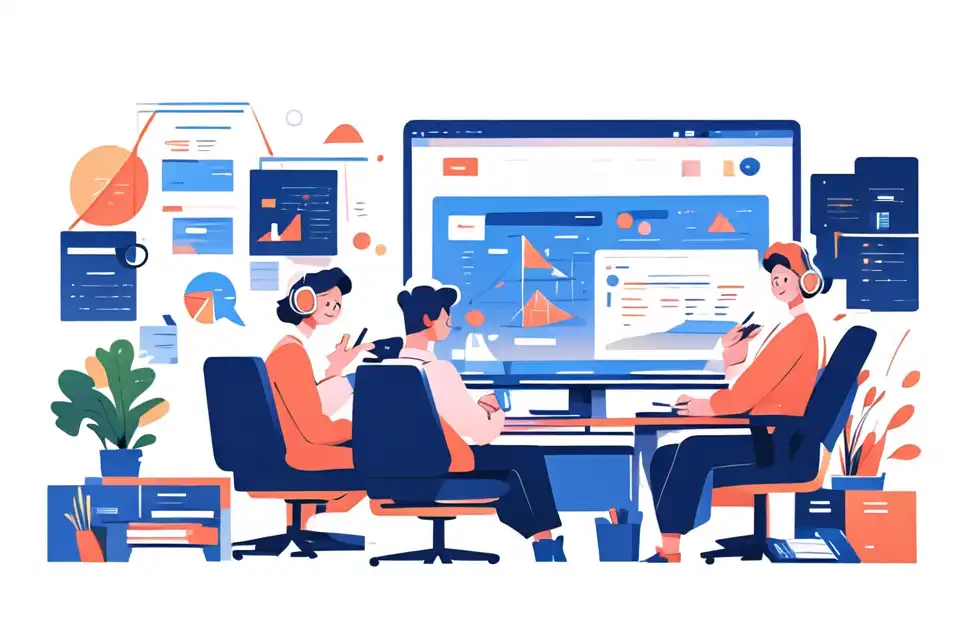Digital Transformation In Education
Learn about the top tips and strategies in digital transformation in education
Try Lark for Free
The Modern Educational Landscape
The role of technology in education has evolved dramatically in recent years. From chalkboards and textbooks, classrooms have transitioned to interactive whiteboards and digital learning platforms. Digital literacy has become a crucial skill, with students and teachers alike being expected to navigate various digital tools effectively.
Why Digital Transformation Matters
Digital transformation in education is not just about the adoption of technology. It represents a fundamental shift in the way teaching and learning are conducted, with a focus on personalization, collaboration, and real-time feedback. It is shaping modern education by making it more engaging, inclusive, and effective.
Trends and Statistics
Digital transformation in education has seen some significant trends. For instance, the use of cloud-based tools like Lark has skyrocketed, with an estimated 74% of educational institutions now using some form of cloud computing. Meanwhile, the global e-learning market is projected to reach $336.98 billion by 2026, reflecting the growing shift towards online education.
Unlock the power of Lark to elevate your business operations. Discover actionable strategies and best practices in our comprehensive guide.
The benefits of digital transformation in education
Enhancing Teaching and Learning
Digital tools offer an array of opportunities to enhance teaching methods and learning experiences. For instance, interactive multimedia content can make lessons more engaging, while online assessments allow for immediate feedback and personalized learning paths.
Impact on Student Engagement and Outcomes
Digital transformation can greatly improve student engagement and learning outcomes. By making learning more interactive and personalized, students are more likely to be engaged and retain information effectively. Studies have shown that digital learning can improve retention rates by 25-60%.
Learn more about Lark can help you with everything mentioned so far in the article.
Implementing digital transformation in education
Steps to Integration
Integrating digital transformation into the curriculum involves several steps, from assessing current technology infrastructure to training staff and students. It's crucial to have a clear vision, a well-defined strategy, and the right tools and resources.
Tools and Resources
Essential tools for digital transformation include cloud-based platforms like Lark, which offer an all-in-one solution for communication, collaboration, and content management. Lark's suite of tools includes video conferencing, chat, calendar, and document collaboration, making it an ideal platform for digital learning.
Case studies and examples
Success stories
Success stories
There are many success stories of digital transformation in education. For instance, a school in the US implemented a one-to-one laptop program, resulting in improved student engagement and achievement. Similarly, a university in Australia adopted a blended learning model using Lark, leading to increased flexibility and student satisfaction.
Lessons learned
Lessons learned
However, these transformations also come with challenges, such as resistance to change, lack of training, and technological issues. These cases teach us the importance of careful planning, comprehensive training, and constant evaluation and adaptation.
Learn more about Lark can help you with everything mentioned so far in the article.
Challenges and solutions
Potential Obstacles
Implementing digital transformation, even in the field of childhood education degree programs, can bring about several challenges. These include technological infrastructure, budget constraints, lack of digital literacy, and resistance to change. For instance, incorporating digital tools and technologies in childhood education degree curriculum might require significant changes in infrastructure and investment. Additionally, educators may need to acquire new digital skills to effectively use and integrate these tools into their teaching methods. There might also be resistance from traditional educators who are accustomed to non-digital teaching methods. These challenges can impact the effectiveness of digital transformation and need to be addressed proactively to ensure the smooth transition of childhood education degree programs into the digital era.
Strategies to Overcome Challenges
Strategies to overcome these challenges include investing in reliable technology, providing comprehensive training, soliciting buy-in from all stakeholders, and adopting flexible and scalable solutions like Lark. Lark's intuitive design and comprehensive support can help overcome many of these challenges effectively.
Future of digital transformation in education
Emerging Trends
The future of digital transformation in education is promising, with several emerging trends. For instance, the rise of artificial intelligence and machine learning is expected to revolutionize personalized learning. Meanwhile, the shift towards remote and hybrid learning models is likely to continue.
The Role of Lark in Shaping the Future
Lark is well-positioned to contribute to the future of digital transformation in education. Its suite of cloud-based tools is continuously evolving to meet the changing needs of educators and learners. With its focus on innovation and user experience, Lark has the potential to shape the future trends in digital education.
Learn more about Lark can help you with everything mentioned so far in the article.
Do's and dont's of digital transformation in education
| Do's | Don'ts |
|---|---|
| Do have a clear vision and strategy | Don't rush the process |
| Do invest in reliable technology | Don't neglect training and support |
| Do engage all stakeholders | Don't ignore potential challenges |
| Do adopt flexible solutions like Lark | Don't resist change |
Learn more about Lark can help you with everything mentioned so far in the article.
Conclusion
The digital transformation in education is a journey that requires careful planning, strategic implementation, and continuous adaptation. However, the benefits it brings in terms of enhanced teaching and learning experiences, improved student outcomes, and future readiness make it a worthwhile endeavor. With tools like Lark, educators can navigate this journey effectively and confidently. So, let's embrace this digital revolution and shape the future of education together.
Unlock the power of Lark to elevate your business operations. Discover actionable strategies and best practices in our comprehensive guide.








